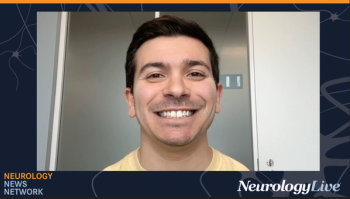
Stress Management Protocol Reduces Depression and Anxiety in Patients With MS: Amy Sullivan, MD
Patients with multiple sclerosis who presented with high-stress maintained their stress management practice through later protocol sessions, according to a study a recent study.
Recent news from a study showed that a 4-session stress management protocol (SMP) reduced self-reported physiological stress, depression, and anxiety in patients with multiple sclerosis (MS). These findings suggest short-term treatment with stress management skills can impact physiological and emotional stress in MS, although the autors noted that MS typical symptom fluctuation most likely impacted the variability in effectiveness.1
In a cohort of 195 patients (aged, 44.4 years; disease duration, 12.1 years; women, 90.5%; White, 68.2%), Patient Health Questionnaire-9 (PHQ-9), General Anxiety Disorder-7 (GAD7), breaths per min (BPM), pulse, and oxygen saturation (SpO2) significantly differed across the sessions. At sessions 2, 3, and 4, PHQ-9 and BPM were lower than patients in the first session. Notably, GAD7 at sessions 3 and 4 and SpO2 at session 3 were lower than in session 1. Overall, patients showed significant improvements across all outcomes except pulse.
"Patients with MS are at high risk for mood disorders including depression, anxiety, stress and bipolar disorder. Stress is an important factor that may worsen MS symptoms and have an effect on the immune system. Rigorous study of the mind-body interaction and stress physiology began in the 21st century. It is now appreciated that many chronic diseases are preceded by lifestyle practices and perceptions but that it may take years for the disease to manifest itself through symptoms and signs,"
Sullivan, director of behavioral medicine at the Mellen Center for MS Treatment and Research at
"Powerful interventions exist, including cognitive behavioral therapy, and should be considered for patients with MS, particularly during stressful periods such as at the time of diagnosis. Acute stressful events and chronic stress can influence and impact MS in the short- and long-term. Considerable evidence supports a reciprocal relationship between stressful life events, MS symptoms, and MS exacerbations, possibly mediated by immune function and autonomic imbalance," Sullivan said. "There is also a reciprocal relationship between disease progression and emotional distress such that disease progression can result in increased emotional distress, while greater emotional distress can increase the risk for further disease progression. The link between emotional distress and its impact and influence on disease activity and outcomes dates back to the earliest research in MS."
Patients were selected from the Mellen Center Behavioral Medicine Database and required to have completed up to 4 sessions of the SMP. After mastering strategies to manage their symptoms sufficiently, patients were able to voluntarily discontinue. Before and after each session, patient-reported depression (PHQ9) and anxiety (GAD7) scores, as well as pulse, BPM, and SpO2 biofeedback measures were collected. Across the sessions, linear mixed-effects models followed by pairwise comparisons assessed the differences. From the first to the final session, paired t-tests evaluated overall improvements, and linear regression modeled overall improvement by the number of sessions completed, which were both unadjusted and adjusted for sex, race, disease duration, and baseline scores.
"The relationship between MS relapses, immune dysfunction, and depression suggests interventions that improve depression or other aspects of mental health could benefit the long-term outcomes in patients with MS," Sullivan added.
Other notable findings included an estimated significant improvement in PHQ-9 at session 3 (1.95 pts) and SpO2 at session 4 (1.61 pts) in the covariate-adjusted models. In the unadjusted models, significant PHQ-9 improvement at sessions 2, 3, and 4 (2, 2.76, and 1.52 pts), GAD7 improvement at sessions 2 and 4 (both 1.62 pts), BPM improvement at session 3 (6.38 BPM), and SpO2 improvement at sessions 3 and 4 (2.85% and 2.12%) were estimated.
The limited research on MS stress management demonstrates that psychotherapy may decrease subjective measures of stress, depression, and anxiety across a variety of modalities and time frames in patients. Studies also show a likely increase in access to care and mental health outcomes with stress management short-term models.1
"We note that we are in a mental health crisis, where access to mental health care is extremely limited. This protocol saw success in 3 sessions and is an excellent way to provide short-term therapy to patients in need and therefore opens up access to the provider," Sullivan told. "Our plans are to expand this to a treatment group, therefore allowing more patients access to the provider and the treatment. Our data shows us that patients with MS who are in the moderate range of depression respond more significantly to the protocol and so focusing on identifying patients with mood disorders early and getting them into treatment is imperative."
REFERENCES
1. Sullivan A, Kane A, Tworek GE, Harvey T. The Impact of a 4-Session Stress Management Protocol on Mood and Physiological Measures of Stress Using Biofeedback in Patients With MS. Presented at: 2023 CMSC Annual Meeting; May 31 to June 3; Aurora, CO. PSY01.
Newsletter
Keep your finger on the pulse of neurology—subscribe to NeurologyLive for expert interviews, new data, and breakthrough treatment updates.











